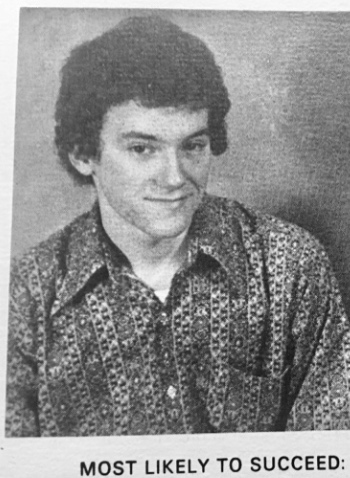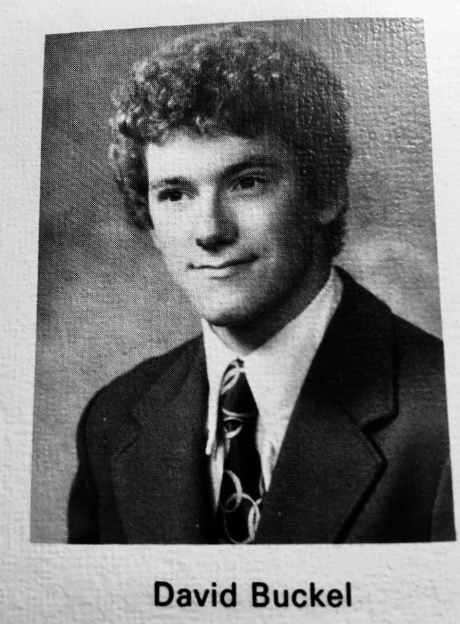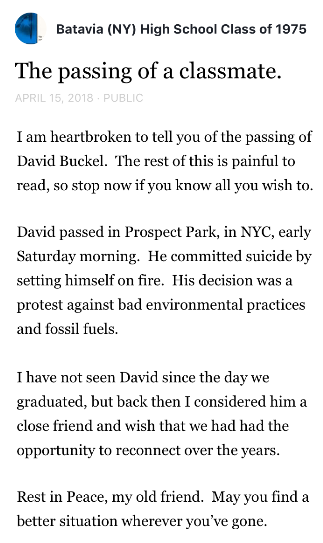
Photo of David Buckel from the nonprofit Lambda Legal.
David Buckel was an environmentalist. He was an LGBTQ advocate. He was an attorney. He started his life in Batavia. He ended it more than two years ago in New York City in an effort to draw attention to the plight of the Earth in a time when it seems so many people are focused on other things.
His death didn’t garner much attention locally, but we remember today him on World Nature Conservation Day.
Most Likely to Succeed
David was a Batavia kid, born here on June 13, 1957. His dad was an agricultural consultant and his mom was a florist.
Her maiden name was Stroh and her family ran a well known floral business in town. After his mother died, he changed his middle name to Stroh in her memory. He had four brothers, two of whom served in Vietnam.

He was a bright student. At Batavia High School, where he graduated from in 1975, he was a member of the National Honor Society and voted the boy Most Likely to Succeed by his classmates. He was active in sports as a member of the varsity cross-country, track, and tennis teams.

After earning a Juris Doctorate degree in 1987 from Cornell University Law School, David began his career as an attorney.
While living in Rochester David was introduced by friends to a man named Terry Kaelber. They hit it off, became a couple and moved to New York City.
As might be surmised from his earlier hospice work, David started his career at Legal Aid assisting those in need of help with the law who couldn't afford it otherwise.
In 1995 David began working for Lambda Legal, which helped LGBT (Q, for queer/questioning, was added to the initialism starting in 1996.) youth and he specifically became a director of the organization's marriage project.
Pair of Legal Victories, Pair of Weddings
During his tenure at Lambda Legal, Buckel was one of the counsel responsible for two big victories.
In 1996 a young gay man named Jamie Nabozny was awarded almost a million dollars after suing a Wisconsin school district for failure to protect him from bullying. The court ruling in Nabozny v. Podlesny also established a legal precedent to protect LGBTQ students from being bullied in all school systems.
In 2001 David was one of the attorneys for JoAnn Brandon, who won a lawsuit in Nebraska against a local sheriff for failing to protect her transgender child who was raped and murdered in 1993. JoAnn's daughter, Teena Brandon, had reversed her name to Brandon Teena while transitioning to a male gender identity. Hillary Swank won the Academy Award for Best Actress in 1999 for portraying Teena Brandon, JoAnn's murdered child, in the movie “Boys Don't Cry,” based on the crime.
Four years after the landmark decision, there was a milestone in David's personal life when he married Kaelber in a double wedding ceremony in Canada. The other couple exchanging vows that day were lesbians with whom the men were raising a daughter. She's now a college student, scheduled to graduate in 2021.
Hooked on Urban Farming
In 2008, Buckel retired from Lambda Legal to devote his time and energy to helping preserve the environment. He became an expert in composting, the reuse of organic garbage.
He spent several years interning at Red Hook's Columbia Street Farm in Brooklyn, where he learned the intricacies of composting peoples' kitchen waste into fertilizer to grow more food. Red Hook had been built on several old baseball diamonds to become the biggest urban farm in the United States.
Eventually, David applied his talent for organizing and planning to become the director of the Brooklyn operation. With the assistance of a large core of volunteers Red Hook was processing 225 tons of compost every year.
Buckel cultivated his workforce of volunteers as well as he did the organic material. He was respected, even beloved by the people he worked with. Several workers said that he changed their life. He ended each work day by thanking the volunteers for helping their Earth.
Buddhism, Trump and the Beginning of the End
As he developed his passion for tending to the environment he also pursued a corresponding interest in Buddhism. With its tenets of inner peace and caring for others it only seemed natural that David would be interested in this way of life. However, the Buddhist methods of protest probably contributed to his untimely end.
After the election of Donald Trump as President in 2016 and the subsequent rollback of Obama era environmental regulations, Buckel's family and friends described him in news accounts as becoming increasingly upset with the trajectory of government actions or inactions.
As 2018 progressed toward April, David began sending emails to his assistant at Red Hook detailing all the things which needed to be done in case of his absence. He also labeled everything at the site, equipment, tools and supplies. His assistant asked him if he was thinking of retiring but he assured him he was not.
Then, before dawn on the morning of April 14th, David Buckel left the home he shared with his family in Brooklyn. He had a shopping cart and headed to a nearby park. He had told no one that he was leaving.
He stopped at a patch of grass in the park off the walkway and apparently built a small wall of earth around himself. He sent an email to the media detailing what he was about to do, poured a flammable substance on himself, and lit it on fire. Within a minute or two David Buckel was dead.
The obvious reaction was shock and sadness. His family, friends, coworkers, former colleagues, and former classmates were bewildered.
They couldn't believe that a quiet, gentle, private man who cared so deeply for others would choose such a public way to end his life in protest. He hadn't even said goodbye to his loved ones.
His family's comment was that they intended to honor his life by carrying on his environmental goals. Coworkers at Red Hook vowed to continue his work.
Lambda Legal issued a statement when they learned of Buckel's death.
Former Batavia High classmates commented on a Class of '75 Facebook page that several had tried to get in touch with David over the years with no success.
They were mystified over his suicide, but remembered him fondly. Former law colleagues were stunned along with everyone else.
Buckel's final email stated that, “My early death by fossil fuel reflects what we are doing to ourselves.”
So, two plus years have now passed since David Buckel's death at age 60.
No one will ever completely understand or be able to give an absolute explanation as to why he chose to make a statement by ending his life in such a horrific way.
But, hopefully people, including Batavians from the community where he grew up, will remember him for the contributions he made to the world and as the good, kind, and helpful person he was.
Read more about David Buckel's life:
A lawyer sets himself on fire to protest climate change. Did anyone care?, The Guardian, April 15, 2019
Remembering David Buckel, the pioneering lawyer who championed LGBT Rights, The New Yorker magazine, April 16, 2018
What Drove a Man to Set Himself on Fire in Brooklyn?, The New York Times, May 28, 2018
Self-immolation can be a form of protest or a cry for help. Are we listening?, The Washington Post, May 30, 2019


